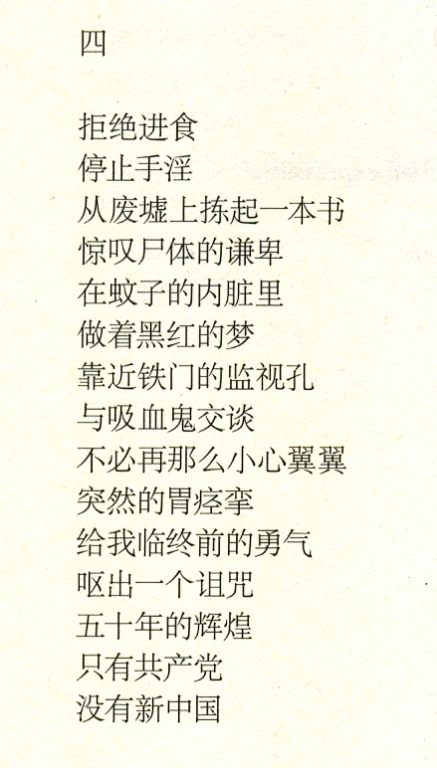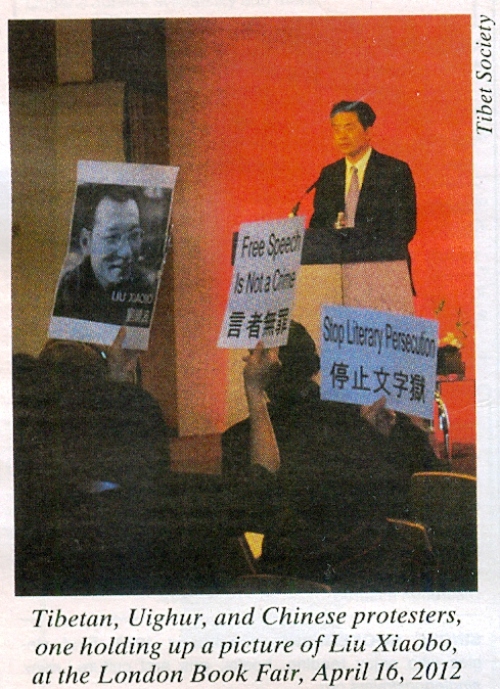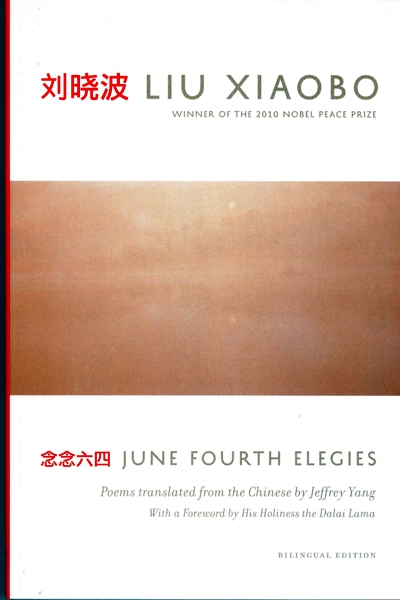|
Bi Khúc 4
Tháng Sáu
Foreword
As a firm
believer in nonviolence, freedom, and democratic values, I have
supported the
nonviolent democracy movement in China from its beginning. One of the
most
encouraging and moving events in recent Chinese history was the
democracy movement
of 1989, when Chinese brothers and sisters demonstrated openly and
peacefully their
yearning for freedom, democracy, and human dignity. They embraced
nonviolence
in a most impressive way, clearly reflecting the values their movement
sought
to assert.
The Chinese
leadership's response to the peaceful demonstrations of 1989 was both
inappropriate and unfortunate. Brute force, no matter how powerful, can
never
subdue the basic human desire for freedom, whether it is expressed by
Chinese
democrats and farmers or the people of Tibet.
In 2008, I
was personally moved as well as encouraged when hundreds of Chinese
intellectuals and concerned citizens inspired by Liu Xiaobo signed
Charter 08,
calling for democracy and freedom in China. I expressed my admiration
for their
courage and their goals in a public statement, two days after it was
released.
The international community also recognized Liu Xiaobo's valuable
contribution
in urging China to take steps toward political, legal, and
constitutional
reforms by supporting the award of the Nobel Peace Prize to him in 2010.
It is ironic
that today, while the Chinese government is very concerned to be seen
as a
leading world power, many Chinese people from all walks of life
continue to be
deprived of their basic rights. In this collection of poems entitled
June
Fourth Elegies, Liu Xiaobo pays a moving tribute to the sacrifices made
during
the events in Tiananmen Square in 1989. Considering the writer himself
remains
imprisoned, this book serves as a powerful reminder of his courage and
determination and his great-hearted concern for the welfare of his
fellow
countrymen and women.
HIS HOLINESS
THE FOURTEENTH DALAI LAMA, TENZIN GYATSO
September 3,
2011
Là một người
vững tin vào bất bạo động, tự do và những giá trị dân chủ, tôi hỗ trợ
phong trào
dân chủ bất bạo động ở TQ kể từ lúc khởi đầu của nó. Một trong những sự
kiện phấn
khởi, cảm động nhất trong lịch sử gần đây của TQ là cuộc vận động 1989,
khi anh
chị em TQ diễn hành công khai và ôn hòa đòi hỏi tự do, dân chủ và phẩm
giá con
người. Họ ôm lấy bất bạo động trong một
cung cách ấn tượng nhất, phản ảnh rõ ràng những giá trị mà phong trào
mong tìm đạt
được.
Nhà cầm quyền
TQ, và cách đối xử của họ đối với những cuộc biểu tình 1989 thì vừa
không thích
hợp, vừa đáng tiếc. Sức mạnh cục súc, dù mãnh liệt cỡ nào, thì cũng
không bao
giờ làm khuất phục ao ước cơ bản của con người cho tự do, hoặc được
diễn tả bởi
những nhà dân chủ và những chủ đất, chủ trại người
TQ, hay người dân Tây Tạng.
Vào năm
2008, cá nhân tôi cảm thấy vừa cảm động, vừa hứng khởi khi hàng trăm
trí thức và
công dân TQ quan tâm, được tạo hứng bởi Liu Xiaobo, đã ký tên nơi Hiến
Chương
08, kêu gọi dân chủ và tự do cho TQ. Tôi biểu lộ lòng kính mến và ái mộ
của mình
trước sự can đảm và những mục tiêu đòi hỏi của họ, trong phát biểu công
khai trước
công chúng, hai ngày sau khi Hiến Chương được công bố. Cộng đồng thế
giới còn thừa
nhận đóng
góp quí giá của Liu Xiaobo trong việc đòi hỏi TQ tạo những bước tiến
trong việc cải cách chính trị, luật pháp,
và định
chế, bằng cách hỗ trợ, và mừng rỡ, khi ông được trao giải thưởng Nobel
Hòa Bình
vào năm 2010.
Một điều trớ
trêu, là, vào ngày này, trong khi chính quyền TQ rất quan tâm tới việc
làm thế nào để TQ
được coi như là một cường quốc trên thế giới, thì chính cường quốc mong
được cả
thế giới công nhận đó, lại đối xử cực kỳ tàn nhẫn với dân chúng của họ,
bằng cách
tước đoạt hết của họ những quyền cơ bản của con người. Trong tập thơ Bi Khúc Tháng
Sáu Ngày Bốn, Liu Xiaobo tưởng niệm, vinh danh những hy sinh,
mất
mát xẩy ra
trong những biến động ở Công Trường Thiên An Môn 1989. Trong khi nhà
văn, nhà
thơ, vào chính lúc này, vẫn còn đang ngồi tù, thì tập thơ quả đúng là
một nhắc
nhở mãnh liệt về sự can đảm, quyết tâm, và sự quan tâm bằng trái tim
lớn nóng hổi
của ông, dành cho xứ sở và đồng bào của mình.
DALAI LAMA

4
Refused to
eat
Stopped
masturbating
Picked up a
book from the ruins
Marvel at a
corpse's humility
Within a
mosquito's internal organs
a dark-red
dream
approaches a
spy-hole in the iron door
Converse
with a vampire
No need to
be so covert so cautious anymore
A sudden
stomach spasm
gives me the
courage before death
to spew out
a curse:
Fifty years
of glory
there's only
the Communist Party
and no sign
of the New China-y
Standing in
the Curse of Time
Before dawn at the re-education through
labor camp
in Dalian, 6/4/1999
Tenth anniversary offering for 6/4
IV
Tuyệt thực
Ngưng thủ
dâm
Nhặt một cuốn
sách từ trên đống đổ nát
Cảm thán sự
khiêm nhường của thi thể
Mơ một giấc
mộng đen đỏ
Ngay bên
trong bụng muỗi
Lại gần lỗ
giám sát (*) trên cánh cửa sắt
Đối thoại với
quỷ hút máu
Giờ đâu cần
phải cẩn trọng tỉ mỉ đến thế
Cơn co thắt
dạ dày đột ngột
Ngay trước
phút lâm chung, mang đến cho tôi dũng khí
Nôn ra một lời
nguyền rủa:
Năm mươi năm
huy hoàng
Chỉ có Đảng
Cộng Sản
Không có nước
Trung Hoa mới
Dã Viên dịch
---------
Ghi chú:
(*) nguyên
văn chữ Hán: "Giám thị khổng" (một cái lỗ trên cửa nhà tù để theo dõi,
giám sát
tù nhân)
Note: Bản dịch
của 1 độc giả TV, từ tiếng Trung.
Tks. Many
Tks.
Take Care.
NQT
TV sẽ đi 1
tuyển tập thơ dịch, từ Bi Khúc 6/4,
trong những kỳ tới. Bản tiếng Việt
sẽ dịch
thẳng từ nguyên tác tiếng Trung, kèm cả hai bản tiếng Trung/tiếng Anh.
Xin kính mời
độc giả đón coi!
Liu Xiaobo
Bi Khúc Bốn
Tháng Sáu
Bi Khúc 2
Standing
in
the Curse of Time
Đứng trong
Nguyền Rủa của Thời Gian
Nguyên tác chữ Hán
IV
Tuyệt thực
Ngưng thủ
dâm
Nhặt một cuốn
sách từ trên đống đổ nát
Cảm thán sự
khiêm nhường của thi thể
Mơ một giấc
mộng đen đỏ
Ngay bên
trong bụng muỗi
Lại gần lỗ
giám sát (*) trên cánh cửa sắt
Đối thoại với
quỷ hút máu
Giờ đâu cần
phải cẩn trọng tỉ mỉ đến thế
Cơn co thắt
dạ dày đột ngột
Ngay trước
phút lâm chung, mang đến cho tôi dũng khí
Nôn ra một lời
nguyền rủa:
Năm mươi năm
huy hoàng
Chỉ có Đảng
Cộng Sản
Không có nước
Trung Hoa mới
Cái tít của
bi khúc, “Thời Nguyền Rủa”, cho thấy sự tương phản giữa hai
câu thơ
Câu
chuyện đông phương cổ xưa ấy
Bỗng muốn nhỏ xuống từng giọt tươi rói
Liu Xiaobo
Và
Giọt mưa trời
khóc ngàn năm trước
Sao còn ướt
trên lưng bàn tay
TMT
Brodsky phán:
Xuyên suốt
cuộc đời 1 người, Thời gian nói [address] với Con Người trong muôn vẻ,
variety,
ngôn ngữ; ngôn ngữ của sự ngây thơ, tình yêu, niềm tin, kinh nghiệm,
lịch sử, ...
Trong những ngôn ngữ đó, ngôn ngữ của tình yêu rõ ràng là một lingua franca, ngôn ngữ bắc cầu. Bộ từ điển
của nó, its vocabulary hấp thụ, nuốt, absorb, tất cả những tiếng nói
khác,
other tongues, và sự phát ra của nó, its utterance, thí dụ, anh
thương em, làm hài lòng, gratify, một
chủ thể, a subject, cho dù vô tri vô giác,
inanimate, cỡ nào. Bằng cách thốt ra như thế, anh thương em,
chủ thể sướng điên lên, và cái sự sướng điên lên đó,
nói lên, làm vọng lên, echoing, cả hai chiều: chúng ta cảm nhận những
đối tượng
của những đam mê của chúng ta, và cảm nhận Lời Chúa [Good Book’s
suggestion], và Chúa là gì, as to what God is.
Tình yêu thiết
yếu là một thái độ được gìn giữ,
maintain, bởi cái vô cùng đối với cái hữu hạn. Sự đảo ngược, the
reversal, tạo
nên, hoặc niềm tin, hay thi ca.
Đoạn trên,
theo GCC, là cơ bản thiết yếu, của thơ Brodsky.
Nói rõ hơn, thơ của ông là thơ
tôn giáo, thơ của một nhà thơ Ky Tô. Chính vì thế, GCC khó nhập vô thơ
ông, vì
là 1 tên ngoại đạo. GCC viết ra, để phúc đáp 1 vị độc giả, tại sao Gấu
lèm bèm
hoài về Brodsky mà không dịch thơ Brodsky!
Bi Khúc Bốn
Tháng Sáu
Bi Khúc 1
Trải
nghiệm cái chết
Bi Khúc 2
Đứng trong nguyền rủa của
thời gian
Cái ngày ấy vô cùng lạ lẫm
II
Mười năm
sau, chính hôm nay
Binh sĩ được
huấn luyện bài bản
Dùng tư thế
chuẩn nhất nghiêm trang nhất
Để bảo vệ sự
dối trá ngất trời
Cờ năm sao
chính là bình minh
Đón gió tung
bay trong ánh sớm
Mọi người
nhón cao gót, vươn dài cổ
Tò mò,
choáng ngợp và kính ngưỡng,
Một người mẹ
trẻ
Giơ cao cánh
tay nhỏ của đứa con trong lòng
Tỏ ý tôn
kính lời dối trá đang che cả bầu trời
Một người mẹ
khác, tóc bạc
Hôn lên tấm
di ảnh đứa con trai
Bà bày ra từng
ngón tay của đứa con
Tỉ mỉ rửa sạch
từng vết máu trên mỗi chiếc móng
Bà tìm không
ra một dúm đất
Để con trai
dưới đất được yên nghỉ
Bà chỉ có thể
treo con ở trên tường
Bà mẹ này đi
khắp những ngôi mộ vô danh
Để soi thấu
lời dối trá thế kỷ
Từ trong cổ
họng bị thít chặt
Nấc ra những
cái tên đã bị ngạt thở
Để tự do và
tôn nghiêm của chính mình
Thốt ra lời
tố cáo sự quên lãng
Bị cảnh sát
theo dõi và nghe lén
2
Ten years
later today's
well-trained
soldiers
a most
official most stately posturing
guard that
wholly monstrous lie
Red
five-starred flag in dawn's
morning
light flutters in the wind
People rise
up on their feet, stretch their necks high
so strange,
such stunned reverence
A young
mother holds her child
to her chest
and raises its little hand
to salute
the lie that blots out the sky
A different
mother hair grayed
kisses a
photograph of her dead son
She pries
open each of his fingers
to gently
wash the dried blood beneath his nails
She's unable
to find a handful of dirt
to give her
son peace beneath earth
She just
hangs her son up onto the wall
This mother
of a nameless grave who walks on
and on to
expose a world's lie
with throat
constricted forces out
the
suffocated names
to turn her
own freedom and dignity
into a
denouncement of forgetting
that tails and
wiretaps the police

London: The Triumph of the
Chinese Censors
Chiến
Thắng Của Anh Tẫu Kiểm Duyệt Ở Luân Đôn
Jonathan
Mirsky
When I
arrived at the London Book Fair on Monday, April 16, I saw a huge sign
outside
showing a cute Chinese boy holding an open book with the words
underneath him:
"China: Market Focus." The
special guest of this year's fair was the
Chinese Communist Party's censorship bureau. Assisted by the
government-funded,
but independent, British Council, the fair's organizers invited the
General
Administration of Press and Publication (GAPP)-the Communist Party's
designated
body for ensuring that all publications, from poems to textbooks, are
certified
fit for the public at home and abroad to read. What has caused a bitter
public
wrangle in London is that Beijing not only chose-with the full approval
of the fair
itself and of the British Council- which writers to bring to the fair.
In a disturbing
repeat of what happened at the Frankfurt Book Fair in 2009, it also
excluded
many of China's best-known writers. Among these are two Nobel Prize
winners:
Gao Xingjian, China's only Literature Prize laureate, who lives in
nearby
Paris, and Liu Xiaobo, the Peace Prize winner who is now serving an
eleven-year
prison sentence. More scandalous still, not one of China's Diaspora
poets and
novelists was invited, even though some of the country's most
distinguished
writers live abroad. "We must be very powerful and they are frightened
of
us," Qi Jiazhen, a fiery, seventy-year-old writer told me, at a meeting
of
Chinese writers in London to protest the fair's corrupt invitation
list.
"That is why they won't let us into the fair."
Fifty
writers attended the meeting, which took place the day before the fair
opened,
including well-known novelists like Ma Jian, author of Beijing Coma. Qi
Jiazhen
was one of three writers in the room who had served jail sentences in
China for
what they had written; she is the author of The Black Wall: The True Story of
Father -and Daughter: Two Generations of Prisoners, an account
of her own
eleven-year sentence and the one of twenty-three years imposed on her
father.
At the fair,
which closed on April 18, China's official presence was overwhelming,
its
stalls, desks, and book "displays taking up more space than those of
any
other country. At the information desk, staffed by young Chinese women
studying
in the UK, I asked whether Gao Xingjian, the Nobel laureate, would be
speaking.
None had heard of him. I said he lived just over the Channel in Paris.
One of the young women said, "Then he's not a Chinese, right?" I said
he was indeed, had lived most of his life there, and had resigned from
the
Party.
They looked
embarrassed. I then asked if Liu-Xjaobo would be attending. They all
edged away
except one, studying mathematics, who said, "I have my feelings about
him,
here, inside." I invited her to tell me what those feelings were, and
she
replied, "I better not." I then asked another young woman, behind the
desk of the main display of Chinese publications-on subjects ranging
from
technical matters to poetry-if Gao Xingjian's books were on show. She
hadn't
heard of him, but said she would ask "my boss." When she asked him in
Chinese if they had Gao's books he said, in English, that Gao wasn't a Chinese
and that, like all foreigners, "he lied about China." I asked
him what
sort of lies. He said in Chinese to his young assistant, "Don't talk to
this foreigner." I told him in Chinese I could understand every word he
had said, whereupon he told me, in English, "You're a shit." I replied,
"Bici, bici," which means,
in effect, the feeling is mutual.
To compensate
for the absence of dissident Chinese authors, the delegation running
the
Romanian stall offered their space to exiled Han, Tibetan, and Uighur
writers.
Ma Jian spoke: There are 118 Chinese publishers here; all are
mouthpieces of
the Communist Party. The writers they have invited are considered
beautiful by
the Party. No ugly person, like those of us here, can speak officially.
We
don't object to the writers who are invited, but until all of us are
free to
speak and write no Chinese writer is free.
John
Ralston-Saul, president of PEN International, also spoke, noting that
thirty-five
Chinese authors are in prison, some for many years, and that more than
a hundred
have been detained. "Why do they do it?" he asked. "Free
expression is the only way to solve any country's social- ills." The
official
PEN statement he handed out recalled "the many [writers] who live in
exile." For her part, Susie Nicklin, the British Council's director of
literature, told The Observer that
the writers approved and invited by Beijing are more representative
because
"they live in China and write their books there," in contrast with
"other writers [who] have left." To this, Yang Lian, one of China's
leading poets, who lives in London, told me: "What's
happening is that countries are becoming companies. And that's what the
British
Council is already, just a company cooperating with the Chinese
company."
What Chinese poets saw in the 1980s, Yang Lian observed,
was
a nation of cultural nihilists ... we had
failed to make a modern transformation of our own tradition. What we
saw
before us was something that could only be called
"Communist culture" ... the worst version of Chinese autocracy hidden
beneath Western revolutionary language.
Finally, I
went to the space where senior representatives of GAPP, the Chinese
publishing
bureau, were talking to the press. Madame Huang, who was representing
GAPP, pressed a stuffed panda into the hands of each reporter as they
were
introduced. "This is a symbol of China," she said, "friendly and
open." In Chinese I asked Madame Huang, who had already given me a
panda,
if either Gao Xingjian or Liu Xiaobo had been invited to appear at the
Book
Fair. She instantly snatched back my panda and hurried away. +
NYRB May 24,
2012
|



